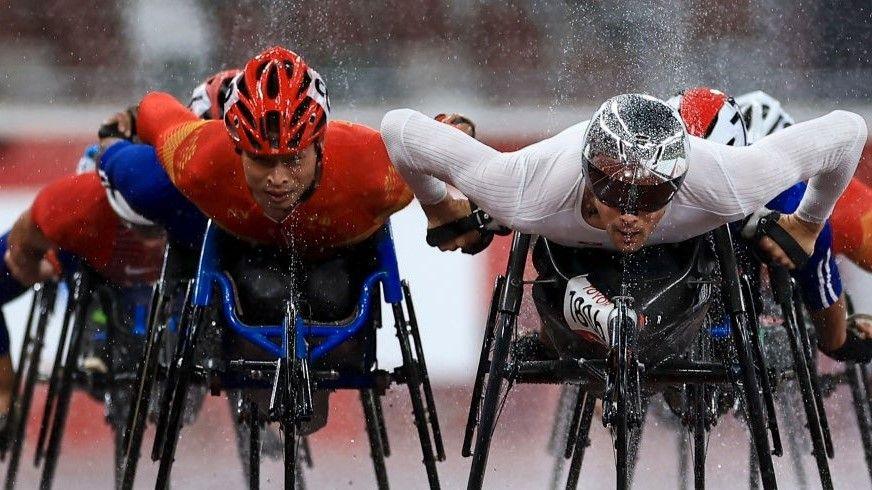Paralympics 2024: A guide to Para-athletics at the Paris Games

Swiss wheelchair racer Marcel Hug in action at the Tokyo Paralympics
- Published
Key information
Dates: 30 August-8 September
Venue: Stade de France (track and field)/Invalides (marathon)
Gold medals on offer: 164
Para-athletics classifications for Paris 2024
Para-athletics caters for competitors from all physical impairments groups, visual impairments and those with a learning disability.
Athletes competing in the track (T) and field (F) events are divided into classifications to ensure fair competition.
Classes 11-13 cover visual impairment with 11 the most severe up to 13 for athletes with more vision. Athletes in these classes can be assisted by guides on the field or the track without giving the athletes any unfair advantages.
Class 20 is for athletes with a learning disability.
Classes 33-34 are for athletes with cerebral palsy (or similar neurological conditions) who are also wheelchair users.
Classes 35-38 are for athletes with cerebral palsy (or similar) who are ambulant and have the ability to run.
Classes 40-41 are for athletes of short stature.
Classes 42-44 are for athletes with lower limb impairments who compete without a prosthesis.
Classes 45-47 are for athletes with upper limb impairments.
Classes 51-58 are for athletes with different levels of spinal injuries and amputations who compete in wheelchairs either on the track or in field events.
Classes 61-64 are for athletes with lower limb impairments who compete with a prosthesis.
Some events will allow athletes from multiple classes to compete against each other.
Who is in the GB squad?
The GB team features plenty of experienced competitors with six Tokyo gold medallists returning to defend their titles.
Wheelchair racer Hannah Cockroft, who will be hoping to add to her seven Paralympic titles, shot putter Aled Sion Davies, javelin thrower Dan Pembroke and high jumper Jonathan Broom-Edwards are all current world and Paralympic champions.
Sprinters Thomas Young and Sophie Hahn are also back - Young has struggled with injury since Tokyo but won silver at the Worlds in Kobe in May while Hahn has seen the emergence of some new athletes to challenge her in her category as she chases a third T38 100m crown in a row.
Sabrina Fortune (F20 shot put), Hollie Arnold (F46 javelin), Sammi Kinghorn (T53 100m and 400m) and two-time Paralympic champion Jonnie Peacock (T64 100m) are among those with medal chances.
And discus thrower Dan Greaves and wheelchair racer David Weir will both be competing at their seventh Games with Greaves hoping to keep up his record of winning a medal every time since his debut in Sydney in 2000.
Who are the other challengers?
Having topped the medal table in Tokyo, China repeated the feat at last year’s World Championships in Paris, ahead of the United States.
They were followed by Brazil, Great Britain and Ukraine but a total of 62 nations won at least one medal in Paris and the sport features a host of stars across all distances, disciplines and impairments.
'Blade Jumper' Markus Rehm of Germany will be hoping to win his fourth consecutive long jump title and extend his world record of 8.72m – a distance which would have won gold at every Olympics since Seoul in 1988.
Swiss wheelchair racer Marcel Hug will hope to maintain his dominance in the T54 division having won four golds in Tokyo, while compatriot Catherine Debrunner will aim to do the same in the women’s T53 class.
China’s Wen Xiaoyan, a winner of three golds in Tokyo, starts as favourite in the women’s T37 sprints while Cuba’s Omara Durand will hope to recover from injury in the T12 event. The fastest Paralympian in the world, Brazil's Petrucio Ferreira, will aim for a third T47 100m title in a row.
In Paris last year, France could only manage four bronzes but will be hoping that visually impaired sprinter Timothee Adolphe and T53 wheelchair racer Pierre Fairbank can spark celebrations.
American 19-year-old Ezra Frech, who competes in the high jump, long jump and 100m, and T38 sprinter Jaydin Blackwell will be among those hoping to put the 2028 Games hosts in a strong position.
And there will be plenty of interest in Italy's Valentina Petrillo, the first openly transgender athlete to compete at the Paralympic Games. She will feature in the women's T12 200m and 400m for athletes with a visual impairment.
Did you know?
Marcel Hug was the sport's most successful competitor in Tokyo with four wins from his four races and the man known as the 'Silver Bullet', for his helmet, will be chasing his seventh Paralympic gold at his sixth Games in Paris.
Away from the track, Hug is a keen reader of philosophy books and likes to swim in Lake Sempach near his home in Nottwil, but says he has struggled when it comes to another hobby - learning to play the guitar.
ParalympicsGB Tokyo 2020 medals
24 - nine gold, five silver and 10 bronze
Hannah Cockroft & Hollie Arnold are also ambassadors to the Super Movers for Every Body campaign from BBC Teach. Visit the Super Movers for Every Body website for inclusive, fun and free Paralympic sport activity resources and learning activities to try, as well as information on how to get into inclusive sport in your local area.